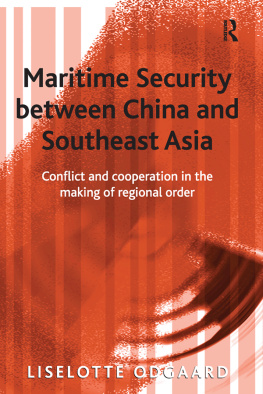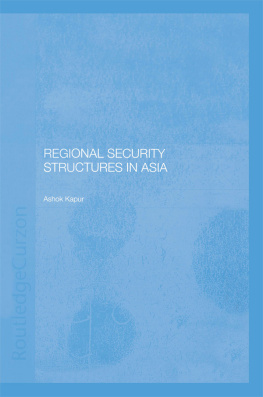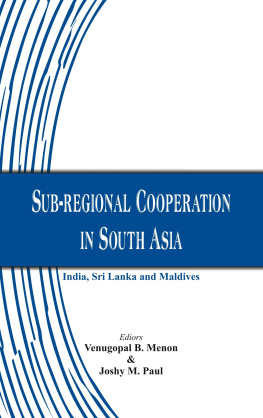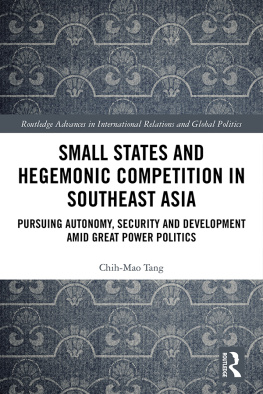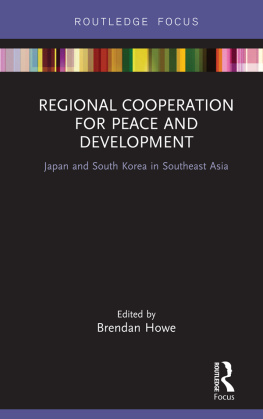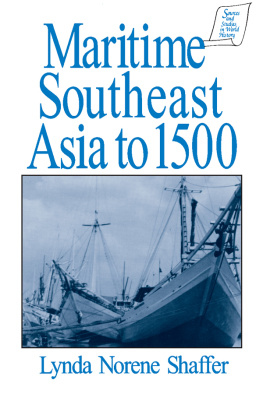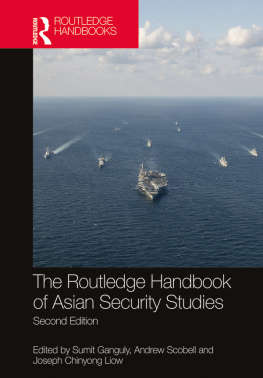First published 2002 by Ashgate Publishing
Published 2016 by Routledge
2 Park Square, Milton Park, Abingdon, Oxon OX14 4RN
711 Third Avenue, New York, NY 10017, USA
Routledge is an imprint of the Taylor & Francis Group, an informa business
Copyright Liselotte Odgaard 2002
The author has asserted her moral right under the Copyright, Designs and Patents Act, 1988, to be identified as the author of this work.
All rights reserved. No part of this book may be reprinted or reproduced or utilised in any form or by any electronic, mechanical, or other means, now known or hereafter invented, including photocopying and recording, or in any information storage or retrieval system, without permission in writing from the publishers.
Notice:
Product or corporate names may be trademarks or registered trademarks, and are used only for identification and explanation without intent to infringe.
British Library Cataloguing in Publication Data
Odgaard, Liselotte
Maritime security between China and Southeast Asia:
conflict and cooperation in the making of regional order
1. Security, International 2. China - Foreign relations
Asia, Southeastern 3. Asia, Southeastern - Foreign relations
- China 4. South China Sea - Strategic aspects
I. Title
327.51059
Library of Congress Control Number: 2001098851
ISBN 13: 978-0-7546-1901-7 (hbk)
ISBN 13: 978-1-138-26396-3 (pbk)
This project comes out of several puzzles. When I first came across literature on maritime security between China and Southeast Asia, I was struck by the frequent depiction of the Spratly dispute in the South China Sea as a hot spot that might result in violent conflict if no serious efforts at dispute settlement were made. As I delved into this literature, I was increasingly convinced that the gloomy picture often painted by the maritime relations between China and Southeast Asia was principally caused by two inter-related focal points.
First, the debate on security in the South China Sea tends to treat maritime security as a peripheral, yet potentially explosive phenomenon. This perspective involves disregard for the inclination of the issue of maritime security to confront Chinese and Southeast Asian policies on the balance of power, diplomacy and international law. Taking this observation as its point of departure, this book argues that the dispute is at the centre of security relations between China and Southeast Asia. The dispute is not merely central because it questions the ability of the states to maintain peace and stability in the South China Sea. The dispute also questions the means by which the states have traditionally maintained regional peace and security. It is this latter challenge that has the most far-reaching consequences for the security relations between China and Southeast Asia because a new regional order is evolving out of the complex disagreement over sovereignty and maritime boundaries in the Spratly dispute.
Second, the continuous dominance of the realist approach in security studies of the Asia-Pacific after the Cold War implies that the prospects of conflict inherent in regional disputes are accentuated. The main ambition of this book is to demonstrate that maritime disputes offer opportunities for inter-state rapprochement as well as risks of conflict. This aim does not mean that the book goes to the opposite extreme, purely focusing on the prospects of cooperation between China and Southeast Asia in the South China Sea. Instead, it is argued that the future of the region is not so much a question of either conflict or cooperation. Both options are possible since elements of an order combining the extremes of national and common interests are emerging as a means to preserve peace and stability between China and Southeast Asia. The present fluidity of security arrangements is caused by the fact that China and Southeast Asia are in the process of establishing an order based on shared rules, concepts of legitimacy and common assumptions. This indeterminate situation allows for a lot of pitfalls, but it also provides possibilities for the establishment of improved security mechanisms.
To capture this development, the book uses the approach of the English school that contains concepts for understanding the nature of international disputes and international order. The book takes issue with the tendency within the English school to adopt a status quo perspective on international order, focusing on a period of transition where international regulatory mechanisms are out of step with developments in the security environment of states. The analytical tools of the English school are developed to allow for the study of security relations marked by fundamental change. The framework provides the basis for understanding the processes of challenge and intervention in the South China Sea that leads to the emergence of a new order.
The work presented in this book would not have been possible without the assistance of numerous people. It is impossible to thank everyone individually, but some people bear mentioning.
I would like to thank the staff at the International Boundaries Research Unit at the University of Durham for allowing me to spend five months with them. This stay provided me with valuable information.
The empirical work of the book could not have been carried out without the assistance of Percaya Desra in arranging my field trip to Jakarta. I am also indebted to Wiwiek Firman and Patti Dino Djalal who provided me with contacts, housing and advice for which I am immensely grateful. I also owe special thanks to numerous other people from the Indonesian foreign ministry who provided me .with crucial assistance. Furthermore, I owe thanks to the Maritime Institute of Malaysia, who assisted me in carrying out fieldwork in Kuala Lumpur. Finally, I would like to thank the Nordic Institute of Asian Studies in Copenhagen for providing assistance at several stages of this project.
I owe special thanks to Stein Tnnesson and the numerous other people involved in the project Energy and Security in the South China Sea at the Centre for Development and the Environment, University of Oslo. I was invited to join their meetings and conferences, which has provided me with stimulating discussions and important advice.
I am particularly indebted to Greg Austin for providing invaluable ideas, inspiration and comments. Also a special thanks to William A. Callahan, David Armstrong, Michael Leifer, Ian Townsend-Gault, Bertel Heurlin and Timo Kivimki for providing useful comments for my work.
The following members of staff at the University of Aarhus provided helpful comments and assistance on the project: Georg Srensen, Clemens Stubbe stergaard, Tonny Brems Knudsen, Anne Mette Kjr, Thomas Olesen, Mehdi Mozaffari, Preben Holst Mogensen, Tina Ro Thomsen, Else Lvdal Nielsen and Helle Bundgaard. Thanks to Nikolaj Petersen for encouraging me to take on the whole enterprise.
It goes without saying that the author is responsible for any deficiencies in this book.

